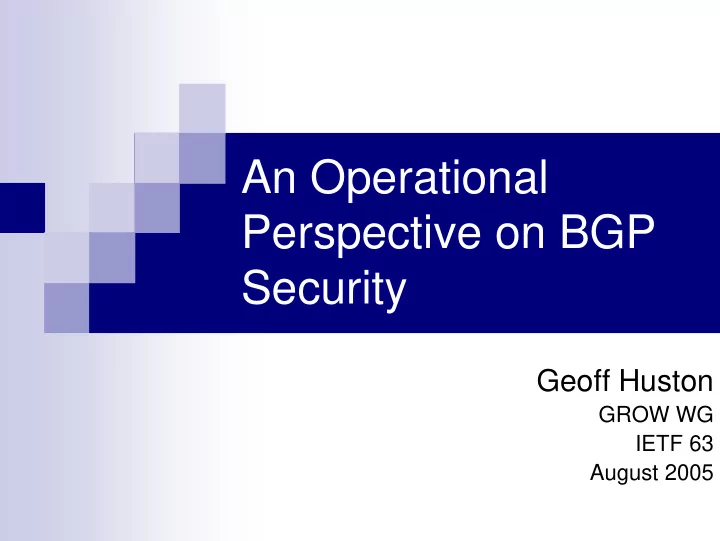

An Operational Perspective on BGP Security Geoff Huston GROW WG IETF 63 August 2005
Risk Management � Operational security is not about being able to create and maintain absolute security. Its about a pragmatic approach to risk mitigation, using a trade-off between cost, complexity, flexibility and outcomes � Its about making an informed and reasoned judgment to spend a certain amount of resources in order to achieve an acceptable risk outcome
Threat Model Understanding the threat model for routing � What might happen? � What are the likely consequences? � How can the consequences be mitigated? � What is the cost tradeoff? � Does the threat and its consequences justify the cost of implementing a specific security response?
Routing Security… Protecting routing protocols and their operation � What you are attempting to protect against: � Compromise the topology discovery / reachability operation of the routing protocol � Disrupt the operation of the routing protocol Protecting the protocol payload � What you are attempting to protect against: � Insert corrupted address information into your network’s routing tables � Insert corrupt reachability information into your network’s forwarding tables
Threats � Corrupting the routers’ forwarding tables can result in: � Misdirecting traffic (subversion, denial of service, third party inspection, passing off) � Dropping traffic (denial of service, compound attacks) � Adding false addresses into the routing system (support compound attacks) � Isolating or removing the router from the network
Operational Security Measures � Security considerations in: � Network Design � Device Management � Configuration Management � Routing Protocol deployment � Issues: � Mitigate potential for service disruption � Deny external attempts to corrupt routing behaviour or payload
Protecting the BGP payload � How to increase your confidence in determining that what routes you learn from your eBGP peers is authentic and accurate � How to ensure that what you advertise to your eBGP peers is authentic and accurate
Routing Security � The basic routing payload security questions that need to be answered are: � Who injected this address prefix into the network? � Did they have the necessary credentials to inject this address prefix? Is this a valid address prefix? � Is the forwarding path to reach this address prefix credible ? � What we have today is a relatively insecure system that is vulnerable to various forms of disruption and subversion � While the protocols can be reasonably well protected, the management of the routing payload cannot reliably answer these questions
What I (personally) really want to see… � The use of authenticatable attestations to allow automated validation of: � the authenticity of the route object being advertised � authenticity of the origin AS � the binding of the origin AS to the route object � Such attestations used to provide a cost effective method of validating routing requests � as compared to the today’s state of the art based on techniques of vague trust and random whois data mining
And what would be even better… � Such attestations to be carried in BGP as payload attributes � Attestation validation to be a part of the BGP route acceptance / readvertisement process
And what (I think) should be retained… � BGP as a “block box” policy routing protocol � Many operators don’t want to be forced to publish their route acceptance and redistribution policies. � BGP as a “near real time” protocol � Any additional overheads of certificate validation should not impose significant delays in route acceptance and readvertisement
Status of Routing Security � It would be good to adopt some basic security functions into the Internet’s routing domain � Certification of Number Resources � Is the current controller of the resource verifiable? � Explicit verifiable trust mechanisms for data distribution � Signed routing requests � Adoption of some form of certificate repository structure to support validation of signed routing requests � Have they authorized the advertisement of this resource? � Is the origination of this resource advertisement verifiable? � Injection of reliable trustable data into the protocol � Address and AS certificate / authorization injection into BGP
Next Steps? � PKI infrastructure support for IP addresses and AS numbers � Certificate Repository infrastructure � Operational tools for nearline validation of signed routing requests / signed routing filter requests / signed entries in route registries � Carrying signature information as part of BGP Update attribute
Question for GROW � Is there interest in working on specification / description of tools that use a resource PKI for near line validation of routing requests?
Recommend
More recommend